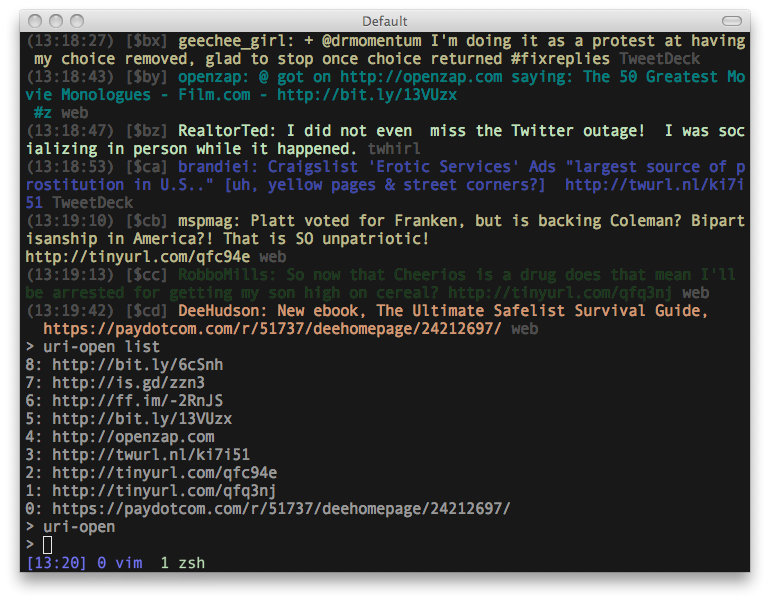I tried My First Blog Tutorial which is documented in Merb official site.
Install
Via http://wiki.merbivore.com/installing_merb_from_edge
I'm not interested in any stable versions of software, so I decided to install
edge merb.
$ git clone git://github.com/wycats/merb.git
$ cd merb
$ sudo rake install
I got messages include errors.
WARNING: description and summary are identical
mv merb-1.1.gem pkg/merb-1.1.gem
Failed to install gem '/Users/ujihisa/git/merb/merb/pkg/merb-1.1.gem (1.1)' (merb requires merb_datamapper (= 1.1, runtime))
WARNING: no rubyforge_project specified
WARNING: description and summary are identical
mv merb-core-1.1.gem pkg/merb-core-1.1.gem
Successfully installed merb-core-1.1
Writing executable wrapper /opt/local/bin/merb
WARNING: description and summary are identical
mv merb_datamapper-1.1.gem pkg/merb_datamapper-1.1.gem
Failed to install gem '/Users/ujihisa/git/merb/merb_datamapper/pkg/merb_datamapper-1.1.gem (1.1)' (merb_datamapper requires merb-actionorm (~> 1.1, runtime))
WARNING: description and summary are identical
mv merb-action-args-1.1.gem pkg/merb-action-args-1.1.gem
Successfully installed merb-action-args-1.1
WARNING: description and summary are identical
mv merb-assets-1.1.gem pkg/merb-assets-1.1.gem
Successfully installed merb-assets-1.1
WARNING: description and summary are identical
mv merb-slices-1.1.gem pkg/merb-slices-1.1.gem
Successfully installed merb-slices-1.1
Writing executable wrapper /opt/local/bin/slice
WARNING: description and summary are identical
mv merb-actionorm-1.1.gem pkg/merb-actionorm-1.1.gem
Successfully installed merb-actionorm-1.1
WARNING: description and summary are identical
mv merb-auth-core-1.1.gem pkg/merb-auth-core-1.1.gem
WARNING: description and summary are identical
mv merb-auth-more-1.1.gem pkg/merb-auth-more-1.1.gem
WARNING: description and summary are identical
mv merb-auth-slice-password-1.1.gem pkg/merb-auth-slice-password-1.1.gem
WARNING: description and summary are identical
mv merb-auth-1.1.gem pkg/merb-auth-1.1.gem
Successfully installed merb-auth-core-1.1
Successfully installed merb-auth-more-1.1
Successfully installed merb-auth-slice-password-1.1
Successfully installed merb-auth-1.1
WARNING: description and summary are identical
mv merb-cache-1.1.gem pkg/merb-cache-1.1.gem
Successfully installed merb-cache-1.1
WARNING: no rubyforge_project specified
WARNING: description and summary are identical
mv merb-exceptions-1.1.gem pkg/merb-exceptions-1.1.gem
Successfully installed merb-exceptions-1.1
WARNING: description and summary are identical
mv merb-gen-1.1.gem pkg/merb-gen-1.1.gem
Successfully installed merb-gen-1.1
Writing executable wrapper /opt/local/bin/merb-gen
WARNING: description and summary are identical
mv merb-haml-1.1.gem pkg/merb-haml-1.1.gem
Successfully installed merb-haml-1.1
WARNING: description and summary are identical
mv merb-helpers-1.1.gem pkg/merb-helpers-1.1.gem
Successfully installed merb-helpers-1.1
WARNING: description and summary are identical
mv merb-mailer-1.1.gem pkg/merb-mailer-1.1.gem
Successfully installed merb-mailer-1.1
WARNING: description and summary are identical
mv merb-param-protection-1.1.gem pkg/merb-param-protection-1.1.gem
Successfully installed merb-param-protection-1.1
ERROR: could not find gem pkg/merb-more-1.1.gem locally or in a repository
I tried to go to next step without considering those errors.
$ cd merb/merb-core
$ sudo rake install
$ cd ../merb-auth
$ sudo rake install
They succeeded.
My First Blog
$ cd ~/tmp
$ merb-gen app my_first_merblog --template-engine=haml
$ cd my_first_blog
$ ls
Rakefile app/ autotest/ config/ doc/ gems/ merb/ public/ spec/ tasks/
cool.
$ merb-gen resource post title:string,body:string
Loading init file from /Users/ujihisa/tmp/my_first_merblog/config/init.rb
Loading /Users/ujihisa/tmp/my_first_merblog/config/environments/development.rb
~
~ FATAL: The gem merb_datamapper (>= 0, runtime), [] was not found
~
Noooo! I don't know whether the last errors caused or not, but I tried below
$ cd ~/git/merb/merb_datamapper/
$ sudo rake install
$ cd -
$ merb-gen resource post title:string,body:string
Loading init file from /Users/ujihisa/tmp/my_first_merblog/config/init.rb
Loading /Users/ujihisa/tmp/my_first_merblog/config/environments/development.rb
Generating with resource generator:
Loading /Users/ujihisa/tmp/my_first_merblog/config/environments/development.rb
Loading /Users/ujihisa/tmp/my_first_merblog/config/environments/development.rb
Loading /Users/ujihisa/tmp/my_first_merblog/config/environments/development.rb
[ADDED] spec/models/post_spec.rb
[ADDED] app/models/post.rb
[ADDED] spec/requests/posts_spec.rb
[ADDED] app/views/posts/show.html.haml
[ADDED] app/views/posts/index.html.haml
[ADDED] app/views/posts/edit.html.haml
[ADDED] app/views/posts/new.html.haml
[ADDED] app/controllers/posts.rb
[ADDED] app/helpers/posts_helper.rb
resources :posts route added to config/router.rb
Yay!
Contrary to rails, specs has been generated instead of tests. Let's spec!
$ rake spec
(in /Users/ujihisa/tmp/my_first_merblog)
Loading init file from /Users/ujihisa/tmp/my_first_merblog/config/init.rb
Loading /Users/ujihisa/tmp/my_first_merblog/config/environments/development.rb
./spec/models/../spec_helper.rb:17: uninitialized constant Merb::Test::ViewHelper (NameError)
from /opt/local/lib/ruby/gems/1.8/gems/rspec-1.2.6/lib/spec/runner.rb:41:in `configure'
from ./spec/models/../spec_helper.rb:16
from ./spec/models/post_spec.rb:1:in `require'
from ./spec/models/post_spec.rb:1
from /opt/local/lib/ruby/gems/1.8/gems/rspec-1.2.6/lib/spec/runner /example_group_runner.rb:15:in `load'
from /opt/local/lib/ruby/gems/1.8/gems/rspec-1.2.6/lib/spec/runner /example_group_runner.rb:15:in `load_files'
from /opt/local/lib/ruby/gems/1.8/gems/rspec-1.2.6/lib/spec/runner /example_group_runner.rb:14:in `each'
from /opt/local/lib/ruby/gems/1.8/gems/rspec-1.2.6/lib/spec/runner /example_group_runner.rb:14:in `load_files'
from /opt/local/lib/ruby/gems/1.8/gems/rspec-1.2.6/lib/spec/runner/options.rb:99:in `run_examples'
from /opt/local/lib/ruby/gems/1.8/gems/rspec-1.2.6/lib/spec/runner /command_line.rb:9:in `run'
from /opt/local/lib/ruby/gems/1.8/gems/rspec-1.2.6/bin/spec:4
rake aborted!
Command /opt/local/bin/ruby
-I"/opt/local/lib/ruby/gems/1.8/gems/rspec-1.2.6/lib"
"/opt/local/lib/ruby/gems/1.8/gems/rspec-1.2.6/bin/spec"
"spec/models/post_spec.rb" "spec/requests/posts_spec.rb" --options
./spec/spec.opts failed
(See full trace by running task with --trace)
Hmm... There seem to be a lot of works to do.
Snap out of it. In accordance with the instruction of the tutorial, I did the
following command,
$ merb-gen resource comment post_id:integer,name:string,body:string
and I fixed config/router.rb.
diff --git a/config/router.rb b/config/router.rb
index 173d73c..360618d 100644
--- a/config/router.rb
+++ b/config/router.rb
@@ -27,8 +27,9 @@
Merb.logger.info("Compiling routes...")
Merb::Router.prepare do
- resources :comments
- resources :posts
+ resources :posts do |p|
+ p.resources :comments
+ end
# RESTful routes
# resources :posts
@@ -43,4 +44,4 @@ Merb::Router.prepare do
# Change this for your home page to be available at /
# match('/').to(:controller => 'whatever', :action =>'index')
-end
\ No newline at end of file
+end
Then I set up the relationships, controller and view. This diff is very long,
so I posted the diff to gist.
http://gist.github.com/117793
Let's run!
$ rake db:automigrate
$ merb
$ open http://localhost:4000


Cool!
But when I posted a comment to a post, an error occured.

Something is wrong. Action '1' was not found in Posts... At first I
suspected that config/routes.rb was wrong, but finally I found the cause is
in app/views/comments/_comment.html.haml. Following patch fixes the problem.
diff --git a/app/views/comments/_comment.html.haml b/app/views/comments/_comment.html.haml
index 7e54ce8..fcebb73 100644
--- a/app/views/comments/_comment.html.haml
+++ b/app/views/comments/_comment.html.haml
@@ -1,6 +1,6 @@
%p= error_messages_for :comment
-= form_for(:comment, :action => "/posts/#{@post.id}/comments") do
+= form_for(:comment, :action => "/posts/#{@post.id}/comments", :method => :post) do
%p= text_field :name, :name => "comment[name]"
%p= text_area :body
%p= submit "Comment"
The cause was the HTTP METHOD was put for some reason instead of desired
post. By specifying post explicitly, the problem was solved.
I fixed the turorial wiki, so a person who tries it will never meet the
problem aftertime.
Deploy
I deployed the sample merb application.
http://67.23.4.19:20090525/posts
The post number 20090525 is today's date.
This sample app server is already stopped.
















